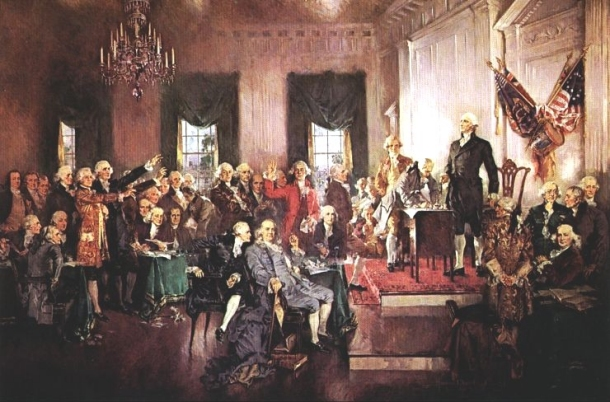It is only one month to go in that most marathon of marathons, the American national election cycle. The process of election in the United States has become so time consumptive, expensive, and career oriented, that the consideration that there are important ideas to be debated and democratically determined often gets lost in the maelstrom. Except….this election cycle. It certainly was originally heading toward being one of those elections where one establishment party would argue with the other establishment party over who would be best positioned to outspend the other for the right to outspend your money. This time, however, a funny thing happened. A growing grass roots process of concerned citizens tired of interchangeable parties and policies decided that this election cycle would be different than all the rest – this election cycle would not be about who was in charge, who was spending more, who was more equipped to “govern – this one would be about ideas.
Imagine that, an election about ideas, not people, we elect to govern us. The tea party movement has calmly stepped on the supposed third rail of politics, that the personal profile of a politician is more important then the ideas they espouse. To the horror of the national establishment parties, the electorate determined time and time again that they would put forth candidates that would be rigorous with principle, and not just appearance. Candidates such as Rand Paul , Scott Walker, Carl Paladino, Sharron Angle, Christine O’Donnell, and Marco Rubio, along with a host of others, have shifted the emphasis from their at times their thin or flawed resumes to the power of their ideas. It is the fear of all establishment parties concerned, that these people might actually vote on their principles. As a result, we , the electorate, have a unique election that requires us to decide what principles we actually believe in.
1. Is the Constitution of the United States the critical document of the American Ideal, or a “guide” to be constantly reformatted and interpreted? When legislators swear to support, protect, and defend the Constitution, should there be accountability? The 2008 Congress left their session in 2010 without putting forth a budget, their primary responsibility under the constitution. They passed governmental takeovers of private industry, banks, and ultimately, the health care decisions of individuals without considering their constitutionality. They left in place a broken immigration system that threatens the concepts of nationhood expressed in the Constitution. Does this ultimately matter to the citizen – the 2008 Congress gambled it would not.
2. Does the Bill of Rights have modern value to the individual citizen? Are the concerns expressed regarding the current legislative negligence regarding -Amendment II: the right to bear arms, Amendment IV: the right of individuals to be secure in their houses, papers, and effects against unreasonable search and seizure, Amendment VI: the right to a speedy trial, Amendment IX, the enumeration in the Constitution of certain rights, not to construe the denial of other rights of individuals, otherwise not mentioned in the Constitution, Amendment X: the rights reserved to the individual states not otherwise specified in the Constitution- sufficiently important to demand compliance by legislators?
3. Should the individual right to “life, liberty, and the pursuit of happiness” be a legislated quality or an individual determination? Do laws that purport to support the public welfare, do so at the expense of civil liberties? Should a government determine what you may eat, how you should educate yourself, what level of comfort you should live in, what kind of house you should live in, what books you should read, how many children you should have, what level of support you may supply your family’s future generations? Should taxes be used to support the nation’s progress and infrastructure, or as a weapon to determine the extent of individual success and redistribute individual achievement and happiness?
4. Should laws be established that provide for the present with no provision as to the future? Does the American Ideal require protective parenting? The nation’s spending habits are driving toward a future where all the nation’s resources will go toward maintain the “comfort” of the population against any other need. Who is looking out for the future generations; should it matter to the living what damage they do to future generations dreams of the above principles of life, liberty, and the pursuit of happiness?
5. Does the concept of Nationhood matter anymore? The current congress and President have legislated strongly toward a globalization process that progressively weakens the concept of the American nation through support of international law standards rather than national ones, pursuit of “climate” legislation, that internationalizes American economic decision making, immigration policies that blur forever the borders and result in acceptance of illegality and inconsistency, and reject the concept of an American leadership role in defending the principles of freedom and civilized behavior. Is a nation a place on a map, a certain racial characteristic, or a consensus of ideas that all within believe in and uphold?
One month to go to the humdinger of all surveys of what we truly believe- its going to be interesting.












